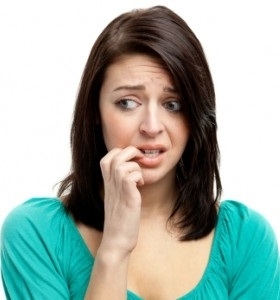We all feel anxious at times. You know that feeling: a tightness in the chest, a sick feeling in the stomach, a tension headache. Anxiety can manifest in many ways and it can affect anyone – men and women, children and adults – at any time. Children, for example, often experience what's known as separation anxiety. Sometimes, our own stresses and anxieties affect our children.
However, it's important to distinguish between normal feelings of anxiety, and an anxiety disorder that is seriously affecting your day-to-day living. If it is, then medical attention or some other form of anxiety relief is required.
Anxiety Disorders
The American Psychological Association describes a person with an anxiety disorder as "having recurring intrusive thoughts or concerns". In order for anxiety to be categorized as an anxiety disorder, the severity of anxious feeling must be out of proportion to the original trigger. It can result in physical symptoms such as raised blood pressure and nausea, rapid heart rate, rapid breathing or hyperventilation, heavy sweating, trembling or muscle twitching, weakness and lethargy, and digestive or gastrointestinal problems such as gas, constipation or diarrhea. In addition, anxiety has also been associated with a higher risk of cardiovascular and cerebrovascular disease.
However, although anxiety disorders are extremely common and affect about 40 million people in the United States – making it the most common group of mental illnesses in the country, only 36.9% of people with the condition receive treatment. Globally, the lifetime prevalence of anxiety disorders is estimated to affect 16.6% of the world's population.
Examples of anxiety disorders include:
- Generalized Anxiety Disorder (GAD): People with GAD experience excessive anxiety for months and suffer a range of symptoms including restlessness and feeling on edge; being tired all the time and having difficulty concentrating; being irritable; and experiencing sleep problems like finding it difficult to fall asleep, or to stay asleep.
- Panic Disorder: People with panic disorder experience panic attacks that manifest as sudden periods of intense fear that may include some of the following physical symptoms – palpitations, pounding or racing heart, sweating, trembling, shortness of breath, feeling smothered or choking. This is often accompanied by an overwhelming feeling of impending doom.
- Social Anxiety Disorder: People with this condition have a marked fear of social or performance situations in which they expect to feel embarrassed, judged and rejected, or are fearful of offending others.
Bottom Line:
Anxiety is not necessarily bad, but a true anxiety disorder can seriously affect your ability to function effectively as a woman and a mother – and this could adversely affect your children. In other words, severe anxiety is not something to be taken lightly. Seeking help or treatment is not an admission of weakness.
Anxiety Disorder Diagnosis And Treatment
Because some of the symptoms of an anxiety disorder such as a panic attack are similar to those of heart disease, thyroid problems, low blood sugar, breathing disorders and other illnesses, people with anxiety disorders often misdiagnose their condition and visit a doctor or emergency room for what they believe is a life-threatening condition.
It is also worth remembering that certain medications can also result in symptoms that imitate or worsen an anxiety disorder. Once these conditions have been ruled out, it is worth having a thorough mental health evaluation because anxiety disorders often coexist with other conditions such as depression or obsessive-compulsive disorder.
Anxiety disorders are generally treated either with psychotherapy (talk therapy) or medication – or a combination of the two. While medication does not cure anxiety disorders, it often relieves the symptoms. Medications can usually only be prescribed by a medical doctor such as a psychiatrist or general practitioner, and in some jurisdictions by a psychologist as well.
The most common classes of medications used to combat anxiety disorders are
- Antidepressants such as selective serotonin re-uptake inhibitors (Fluoxetine, Citalopram, Sertraline, Paroxetine; Escitalopram); serotonin; and nor-epinephrine re-uptake inhibitors (venlafaxine and duloxetine).
- Anti-anxiety drugs such as benzodiazepines (Clonazepam; Alprazolam and Lorazepam)
- Beta-Blockers - used to treat the short-term symptoms of anxiety.
Antidepressants are generally safe and effective for many people, but they may cause a whole host of side effects including nausea, blurred vision, headaches, confusion, tiredness and nightmares.
Using antidepressants for children, teens and young adults is not recommended - and this is probably true for natural anti-anxiety treatments too.
In addition, a "black box" warning – the most serious type of warning that a prescription can carry – has been added to the labels of antidepressants warning that this class of drugs may cause some people to have suicidal thoughts or make suicide attempts. For this reason, anyone taking an antidepressant should be monitored closely, especially at the start of the course of treatment.
Bottom Line:
Self-diagnosis of anxiety can be problematic as it could mask, or imitate, other serious physical conditions. There are many different synthetic medications available, all of which have undergone rigorous testing for efficacy and safety. It is also worth considering psychotherapy with a professional therapist.
Natural Treatment Alternatives
Many people turn to alternative treatments for anxiety relief. Although most plants have not been studied for their therapeutic value or side effects, there are some herbal treatments that indicate that certain plant-derived substances can help with psychological problems. In fact, a number of reviews of the clinical efficacy of herbal and nutrient treatments for depression and anxiety disorders have been published over the last decade. These have focused largely on Passionflower, lysine, magnesium, kava and St John's wort, either alone or in combination.
Herbal Medicines
- Passionflower has long been used by people all over the world to treat anxiety. There have been three human trials that examined the effect of passionflower, one of which indicated that it is as effective as benzodiazepines in eliminating anxiety symptoms, although it did not work as quickly. Some mild adverse reactions were reported in one study – drowsiness, dizziness and confusion.
- Kava has been widely used over centuries to relieve anxiety, restlessness and insomnia. The first randomized, placebo-controlled, double-blind study of kava for the treatment of people diagnosed with anxiety disorder was conducted in 1997 where it was shown to have fewer side effects than benzodiazepines or tricyclic antidepressants and subsequent studies indicated that it had real therapeutic potential as a treatment for anxiety disorder.
- St John's wort is licensed in Germany to treat anxiety, depression and sleep disorders and there is some evidence that it is as effective in treating anxiety and depression as conventional treatments.
Other herbal treatments that may hold some promise for the treatment of anxiety include Valerian, Chamomile, Lavender and Lemon balm – but far more research is required.
Nutritional Supplements
- Lysine, which has been shown to act as a partial serotonin receptor, can improve users' ability to handle induced stress with no reported side effects.
- Magnesium is involved in many important molecular functions in the body and has been linked to anxiety-related disorders. Studies indicate that magnesium supplementation is effective at treatment anxiety disorders when used in combination with other vitamins, minerals and herbal extracts – but more study is needed to determine whether it helps to treat anxiety independently.
Bottom Line:
While all these natural substances show promise as anxiety relief treatments, more research is required to confirm their potential, as well as to determine the optimal dosages required. If you're considering taking any herbal supplement as a treatment for anxiety, talk to your doctor first, especially if you take other medications. The interaction of some herbal supplements and certain medications can cause serious side effects.
Our Ultimate Take Home Message
If anxiety is affecting your day-to-day functioning, you should not ignore it and try to "get on with it" or "pull yourself together". Seek help and obtain a proper diagnosis before self-medicating. In particular, do not try to treat your children for anxiety with any of the popular anxiety relief medications without the supervision of a qualified practitioner.













